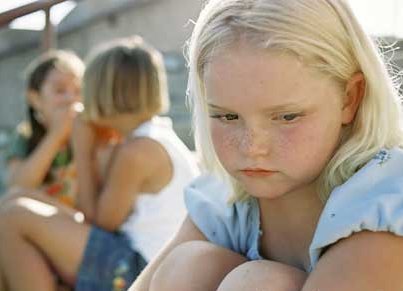
Autistic Bullies & Good Girl Bullies
We tend to think of a bully as someone from a bad home or just a “bad kid” – but what about Good Girl Bullies? Or when the Autistic Kid is the Bully?
In a 3rd grade classroom Jane and Robin are best friends. Robin knows that Jane is mildly autistic, but Jane seems to act like the other kids, so Robin dismisses that Jane is different.
Every day Jane and Robin play together during recess, but one day Haley walks up to Robin and asks “We‘re going to play snow leopards at recess, want to come?”
Robin asks “Can Jane play too?”
And Haley says “Ok!”
Robin runs to tell Jane “Come on! We’re going to play snow leopards today with Haley and the other girls.”
Jane says “No. I want to play with you.”
Robin tells Jane “I‘m going to play with Haley. Are you coming or not?”
Jane gets upset “You‘re not my friend!”
Robin is a little confused, but since it’s obvious Jane doesn’t want to be friends, Robin goes to play with Haley and the other girls, because they want to be her friend.
Jane is hurt and angry, Robin just left her.
Jane walks over and grabs Robin by the arm “You’re coming to play with me!”
Robin is a people pleaser and since Jane is quite literally pulling Robin away, she goes along.
Jane is still very upset and isn’t much fun.
Robin tells Jane they should both go play with the other girls.
Jane becomes very angry “If you don‘t stay and play with me I‘m going to punch you!”

Robin gets a little scared and runs away.
Ummm Bullying? Or Not?
Let’s continue.
Robin runs back to play with Haley.
Jane walks over to once again retrieve Robin.
Robin whispers in Haley’s ear “Jane‘s about to Pop!” and the 2 girls laugh.
Jane once again grabs Robin by the arm and starts to pull her away. Jane is even more upset now, not only did Robin abandon her again, but now the girls are laughing at her.
Robin’s arm is hurting and becoming bruised, Jane is a whole year older and twice the size as Robin and is dragging Robin along like a rag doll.
Luckily the bell rings and the girls go in for lunch.
Jane and Robin are in the same class so they sit at the same table at lunch, usually together. Robin decides that today she better sit by someone else.
Jane feels alone, she can‘t figure out why her best friend doesn‘t want anything to do with her.
Jane gives Robin several glaring looks which are picked up by the boys sitting beside Robin and the story begins. Robin tells the boys about what happen hoping to gain sympathy. It works, a little to well and the gossip starts.
So who is in the wrong? Who is the bully?
Jane is mildly autistic, but she knows better than to physically pull another person and she would never actually punch anyone. But is she really bullying? Or is she confused about why Robin left and trying to express herself in the only way she can.
Robin is a people pleaser, she wants to be friends with everyone. As Robin is telling stories about Jane she’s becoming friends with everyone. Suddenly Robin is popular and she is to young to realize the consequences of gossip.
![]() The normal response?
The normal response?
Jane’s mother: “Jane would never punch anyone, you know that. Jane has a disability and she’s worked hard to build a friendship with Robin. Robin is making fun of my daughter and you tell me Jane is a bully!”
Robin’s mother: Jane threatened my daughter and you’re telling me that Robin is the bully!! If Jane would just play with the other girls there wouldn’t be a problem.
Perspective!
Now what?
Robin wasn’t doing anything wrong when Jane came and pulled her way. She’s telling her new friends what happen – there’s nothing wrong with that. Jane hurt her arm and doesn’t want to play with the other girls, that’s not Robin’s fault.
Jane can’t mentally cope with all the other girls. She understands that she’s not supposed to physically pull someone anywhere against their will, but she doesn’t understand that Robin isn’t strong enough to pull herself away and doesn’t understand why Robin is doing this to her.
Kids don’t have the skills to work this out on their own. We can’t tell our children how they are supposed to act in every situation – no one can remember all that. And most importantly Lessons don’t teach – Experience teaches.
So where does this leave Parents and Schools?
